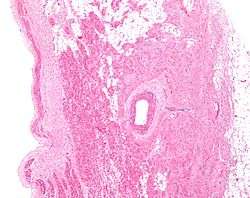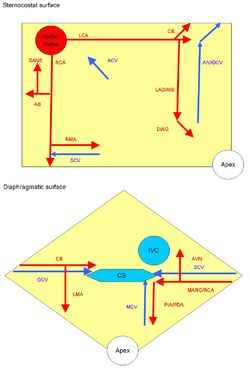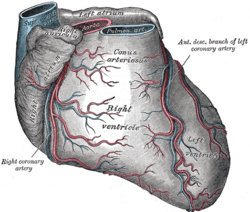Sinoatrial nodal artery
The sinoatrial nodal artery (or sinuatrial nodal artery or sinoatrial artery) is an artery of the heart which supplies the sinoatrial node, the natural pacemaker center of the heart, and arises from the right coronary artery in around 60% of people. In about 40% of cases, the sinoatrial artery is a branch of the left circumflex coronary artery.[1] In less than 1% of humans, the artery has an anomalous origin directly from the coronary sinus, descending aorta, or distal right coronary artery.
| Sinoatrial nodal artery | |
|---|---|
 Low magnification micrograph of a sinoatrial node (central on image), surrounding the sinuatrial nodal artery (on lumen in the image). H&E stain. | |
 Arteries: RCA = right coronary AB = atrial branches SANB = sinuatrial nodal RMA = right marginal LCA = left coronary CB = circumflex branch LAD/AIB = anterior interventricular LMA = left marginal PIA/PDA = posterior descending MARG = left marginal AVN = atrioventricular nodal Veins: SCV = small cardiac ACV = anterior cardiac AIV/GCV = great cardiac MCV = middle cardiac CS = coronary sinus | |
| Details | |
| Identifiers | |
| Latin | Ramus nodi sinuatrialis arteriae coronariae dextrae |
| TA | A12.2.03.104 |
| FMA | 3823 |
| Anatomical terminology | |
In more than 50% of human hearts, the artery actually courses close to the superior posterior aspect of the interatrial septum.[2] The origin of the sinoatrial node artery is not related to coronary artery dominance, which means the side (right or left) that provides the circulation to the back of the heart. In contrast, the atrioventricular nodal branch, that is the artery that brings blood to the atrioventricular node, depends on coronary artery dominance.
The sinoatrial node surrounds the sinoatrial artery, which can run centrally (in 70% of individuals) or off center within the node.[3]
A left S-shaped sinoatrial artery, originating from the proximal left circumflex or LCx artery, has been described as a common variant in approximately 10% of human hearts.[4] This artery is larger than normal and supplies a good part of the left atrium, but also right sided structures like part of the sinoatrial node and the atrioventricular nodal areas. In this variant, the artery courses in the sulcus between the left superior pulmonary vein and the left atrial appendage where it could be susceptible to injury during catheter or surgical ablation procedures on the left atrium, especially for atrial fibrillation ablation or open heart cardiac surgery.
Additional images
 Sternocostal surface of heart (right coronary artery visible at left)
Sternocostal surface of heart (right coronary artery visible at left)
References
- Pejković B, Krajnc I, Anderhuber F, Kosutić D (July 2008). "Anatomical aspects of the arterial blood supply to the sinoatrial and atrioventricular nodes of the human heart". Journal of International Medical Research. 36 (4): 691–8. doi:10.1177/147323000803600410. PMID 18652764.
- Click RL, Holmes DR Jr, Vliestra RE et al. Anomalous coronary arteries: Location, degree of atherosclerosis and effect on survival-A report from the coronary artery surgery study. J Am Coll Cardiol 1989; 13:531-537.
- Sanchez-Quintana D, Anderson RH, Cabrera JA, et al. The terminal crest: morphological features relevant to electrophysiology. Heart 2002;88: 406–411.
- Saremi F, Channual S, Abolhoda A et al. MDCT of the S-shaped sinoatrial node artery. Am J Roentgenol 2008; 190:1569-1575.